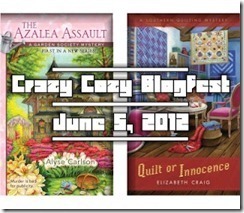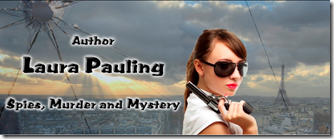Elizabeth Spann Craig's Blog, page 177
June 1, 2012
Showing Character
by Elizabeth S. Craig, @elizabethscraig.
[image error]I’m currently reading a mystery (no surprise there) that I’m really enjoying: Death of a Cozy Writer by G.M. Malliet.
One thing I love as a mystery reader is finding clues to a character’s personality, talents, or weaknesses.
One of the characters in the book, Albert, (no spoilers, I promise), is a major alcoholic. His siblings talk about how much he drinks, and he’s portrayed as inebriated at every meal and even in the mornings.
Another character, Jeffrey, is mulling over people he’s recently met, one of them Albert. He thinks that:
…he rather had the idea Albert drank.
This made me laugh at the understatement and the general cluelessness of the character. It also gave me an important insight into Jeffrey’s character—he’s not observant. In a mystery, this means that his impressions of other characters/suspects in the book might not be accurate.
I’m not a fan of reading info dumps. An author could describe a character with well-written, vivid details and I’ll going to skim it. I’m usually more interested in picking up on little details that point to qualities the character has. Or a slipped-in description—a character whose shoulders are stooped from listening to shorter people around him. Or the character with lots of smile lines and raven’s feet….sort of a double-duty description. Cheerful and wrinkly!
With indirect characterization, you let the reader draw their own conclusions: based on character dialogue, internal musings shared with the reader, and other characters’ observations about a character. Then the readers can pick up the hints and feel clever about their deductions.
For instance, we can show one character’s demeanor when dealing with the protagonist—and add dialogue clues to hint at character traits and the characters’ relationship with each other.
You could have a character that you want to portray as someone who talks too much. This could easily be expressed by interruptions from a second character or their signs of impatience. Or of them putting off a phone call with the character. Much better than pages and pages of chatty dialogue to prove the point.
Since I’m a mystery writer, I’m also interested in planting the wrong impression of a character. I might mislead the reader. (Other novelists might want to do the same thing, for different reasons.) Maybe the character is unnaturally chatty because they’re nervous. Maybe the second character is just an impatient person who interrupts—maybe they’re not making a point about the character’s loquaciousness at all.
Do you enjoy leaving clues to your characters’ personalities and appearance?
Image—Flickr—Brian D. Perskin
May 29, 2012
Preparing for a Writing Career
by Elizabeth S. Craig, @elizabethscraig
 I was interviewed recently and one of the questions I was asked was what type of preparation or training I’d received to become a novelist. I think the person asking the question thought that I had an MFA (Master of Fine Arts.)
I was interviewed recently and one of the questions I was asked was what type of preparation or training I’d received to become a novelist. I think the person asking the question thought that I had an MFA (Master of Fine Arts.)
Which, actually, I don’t. I have a BA and was an English major. Although I wrote a lot in school and read and discussed some amazing literature, I didn’t take a single creative writing class.
Writing isn’t a normal kind of job. Well, it is from the aspect that you have to practice it to improve your skill, but it’s not like becoming a doctor where you have to go to graduate school and then intern at a hospital before moving on to private practice. You can go that route, if you’re interested in grad school. But you don’t have to go that route to become a writer.
These things could help:
Reading. Most of the writers I know are avid readers…and would like to spend more time reading than they’re able to. Writers usually love words and playing around with arranging them to achieve different effects.
Looking at the world through a lens. Being an observer. Sometimes I feel like everything is a story—that I frame life like a story. So when the kids tell me about their day at school….I’m hearing a story (hopefully a non-fiction one.) :)
Practicing. It’s really the only way to improve.
Determination. I think we all have to be determined or even stubborn to protect our writing time or to have the guts to submit our writing for publication.
Time management skills. In this age of distraction, time management skills are key.
Discipline. This goes hand in hand with time management.
And I’ll just end this by saying that you don’t need a published book to call yourself a writer. If you write, you’re a writer, plain and simple. And even if you’d rather not tell people you’re a writer (a lot of pressure can come with that announcement), just acknowledging it to yourself can make a big difference in your attitude and approach to the craft.
What skills or preparation do you think are helpful for writers? Can you add to my list?
Image: Flickr user Lawrence OP
May 28, 2012
Covering Our Bases
by Elizabeth S. Craig, @elizabethscraig
 Blogger is being obnoxious and frequently putting genuine comments into my blog’s spam folder. I’ve rescued a few of them and have noticed that the common thread seems to be that they all had a question in the comment. It’s very annoying that Blogger would flag those as spam and I apologize for not being vigilant in cleaning out my spam folder.
Blogger is being obnoxious and frequently putting genuine comments into my blog’s spam folder. I’ve rescued a few of them and have noticed that the common thread seems to be that they all had a question in the comment. It’s very annoying that Blogger would flag those as spam and I apologize for not being vigilant in cleaning out my spam folder.
Two of the comments actually asked the same question: what was my opinion of self-publishing?
I really don’t want to be in the position of advising anyone what they should do in regard to publishing their book. My opinion on the topic is evolving—which is only natural, considering that the industry is evolving. I know what I’m planning on doing.
I’m going to continue, in the short-term, what I’m doing now…both traditional publishing and self-publishing.
For one thing—I’m contracted out for the next year, in terms of writing books. I’ll have books coming out with Penguin for 2012, 2013, and 2014. If the series aren’t continued after that, I’m going to assess what the publishing landscape in 2014 is and either pitch publishers another series idea (I’ve got one), or just continue self-publishing, but at a faster pace than I currently am (I’ve currently got two self-pubbed books out.)
But the question from my commenters seemed to be more “what would I do if I were an unpublished writer with a finished manuscript?”
Again, I can only say what I’d do. Right now, I’d probably still try to send queries out on the book (although—if it were a series….I don’t know. Maybe I wouldn’t.) I wouldn’t wait years for the project to sell. I did that in 2005 with a book that finally sold in 2009. I wouldn’t do that again.
I’d write something else in the meantime. And then something else. And I’d put at least one of those projects (after I’d paid a freelance editor or two) up as a self-published book.
Some would say that I’d lose money by choosing to go with a traditional publisher at all. This is true. I do seem to make more money on my self-pubbed books than I make on my traditional books—and I’ve only been tracking it since November. I don’t honestly know, though, if that’s because I have a name as a traditional author or because I have a decent-sized online platform.
Basically, I think we should cover our bases. I’ll traditionally publish, I’ll self-pub, and—when I have a moment—I’ll probably branch out into broader areas of my genre, too—maybe police procedural or psychological mysteries. Maybe I’ll try short stories, too. Eventually, maybe I’ll write other genres, too. I think it’s important to consider all our options, in every way.
I also don’t think we should put all our eggs in one basket. I don’t have a problem with Amazon (it would be dumb of me to…I’ve made money with them), but we shouldn’t be exclusive. Who knows what’s coming down the road? We should be available on other online formats, too—Nook, Smashwords, etc.
These are my thoughts on it now—but the way the industry is changing so quickly, I might change my mind again before long!
Are you keeping your options open as a writer?
And—it’s Memorial Day here in the States where we remember those who made the ultimate sacrifice in service to their country. Many thanks to those who have served in the armed forces.
Photo credit—mtkojima on Flickr
May 26, 2012
Twitterific
by Elizabeth S. Craig, @elizabethscraig
Twitterific is a compilation of all the writing links I shared the previous week.
The links are fed into the Writer’s Knowledge Base  search engine (developed by writer and software engineer Mike Fleming) which has over 16,000 free articles on writing-related topics. Sign up for our free newsletter for monthly writing tips and interviews with top contributors to the WKB or like us on Facebook.
search engine (developed by writer and software engineer Mike Fleming) which has over 16,000 free articles on writing-related topics. Sign up for our free newsletter for monthly writing tips and interviews with top contributors to the WKB or like us on Facebook.
 Don't' forget the new release blogfest that Hart Johnson and I are hosting on June 5th—find more information and sign up here. The best entries get signed copies of our new releases.
Don't' forget the new release blogfest that Hart Johnson and I are hosting on June 5th—find more information and sign up here. The best entries get signed copies of our new releases.
Have a great week!
Self-tracking--how we're documenting our daily lives online: http://bit.ly/KwU0sG @nora3000 @Porter_Anderson @sparkcbc
7 Steps to Creating Suspense: http://bit.ly/Jnkiyz @write_practice
20 Tips for Writing Lovable Romance Novel Heroes: http://bit.ly/Jnmt5b @AdriennedeWolfe
How Short Stories and Novels Are Different: http://bit.ly/JnmIx9 @Janice_Hardy
7 POV Basics: http://bit.ly/JnmKVC @JodyHedlund
Writing a Marketable Children's Short Story: http://bit.ly/JnmTIP @Margo_L_Dill
New ebooks to libraries--a look at Hachette's pilot program: http://bit.ly/KBw95F @Porter_Anderson @laurahazardowen @HachetteBooks
1 writer's process of revising her children's picture book: http://bit.ly/Jnn9rn @MaureenLynas
How digital stalking can get you published: http://bit.ly/Jnnb2q @thefuturebook
Cool Finds for Writing: http://bit.ly/JnndXY @cherylrwrites
Writing marketable memoirs: http://bit.ly/JnnudE @behlerpublish
AAR Fail: http://bit.ly/Jnnzhc @JAKonrath
e-Publishing Revo: It's a New Electronic Self-Publishing Service, But There's a Catch: http://bit.ly/JnnDhc @victoriastrauss
Keeping Writers as Pets: http://bit.ly/JnnKJF
3 Tools To Help You Find The Best Time To Tweet: http://bit.ly/JnnOZM @authormedia
Top 10 pseudonymous books: http://bit.ly/MvsnRl @guardianbooks
From Writer to Author to Publisher to Marketer: http://bit.ly/Mvsrka @jfbookman
The real threat to (big time) book publishing: http://bit.ly/MvszA9 @ProjectDomino
Going Deeper: A Process Rather Than A Technique: http://bit.ly/MvsIDR @RLLaFevers
Avoiding Homonym Headaches: http://bit.ly/MvsTiv
Why Moms Matter in YA and Children's Literature: http://bit.ly/MvsZ9M @diymfa
Characters Need Goals: http://bit.ly/Mvt2T0 @noveleditor
Distinguishing Between Straight-Up Advice and Paradigm Shift: http://bit.ly/Mvt6SA @janefriedman
8 Dialogue Mistakes to Avoid: http://bit.ly/MvtdO8 @fictionnotes
Tips for expanding time in our stories: http://bit.ly/MvtxMP @margielawson
Crime fiction cases where the police know the perp, but can't prove it: http://bit.ly/LoxelQ @mkinberg
3 Mighty MacGuffin Generators: http://bit.ly/Mvtzo3 @speechwriterguy
Writers beware of exclusives: http://bit.ly/MvvwAC @behlerpublish
3 Tips to Write Like Kurt Vonnegut: http://bit.ly/MvvDwg @joebunting
How to Record & Share Google+ Hangouts: http://bit.ly/MvvF7f @mediabistro
Becoming your character: http://bit.ly/MvvYit @KMWeiland @ggvandagriff
Why Writers Must Be Observers: http://bit.ly/Mvw1us @ava_jae
The aloof author is dead: http://onforb.es/Mvw3Ti @forbes
An Evening in the Life of a Debut Novelist: http://bit.ly/MvwsFg @blurbisaverb
The 10 best historical novels: http://bit.ly/M5Mm6r @guardianbooks
Hunger Games: A Slippery First Plot Point: http://bit.ly/M5Mpzn @storyfix
9 Steps to Take When You Loathe Your Own Blog: http://bit.ly/M5My5C @ryanbarton
Writing in stolen time: http://bit.ly/M5MEKK @womenwriters @HazelGaynor
Tips for bookstore events: http://bit.ly/M5ML95 @literaticat
Keep Readers Close to Action and Emotion: http://bit.ly/M5MRgS @noveleditor
How to Create a Promotional Trailer for Your Book: http://bit.ly/M5MX8f @fantasyfaction
33 things to do when you are feeling a bit angry with your novel: http://bit.ly/M5N6IQ @YAHighway
All the writing links I shared last week: http://bit.ly/JpcSei
Story structure--fitting in prologues or epilogues, flashbacks, etc.: http://bit.ly/L8CwP4 @KMWeiland
Indie or Traditional Publishing? Don't Take Sides: Take Your Time: http://bit.ly/L8CxCx @annerallen
Start Your Day More Productively: http://bit.ly/L8CA1d @authorEMS
The Best E-Publishing Resources: http://bit.ly/L8CCGq @JaneFriedman
Outlining From A Finished Draft For Pantsers: http://bit.ly/L8CHd5 @BryanThomasS
How To Sell Self-Published Books: One at a Time: http://bit.ly/L8CMxs @cathryanhoward
Another Take On "Show, Don't Tell" For Writers: http://bit.ly/L8CSFf
7 Tricks to Write More with Less Willpower: http://bit.ly/LtjHM3 @write_practice
Confessions of a Contest Judge: http://bit.ly/LtjKHM
Style Sheets: The Writer's Punch List: http://bit.ly/LtjWXv @MariaZannini
Stories in your pocket: how to write flash fiction: http://bit.ly/Ltk9Km @guardianbooks
7 Terms with the Root "-Vore": http://bit.ly/LtkmNB @writing_tips
Lessons 1 writer has learned about memoir writing: http://bit.ly/LtkuwE @jhansenwrites
10 things 1 writer's blog has taught her: http://bit.ly/LtkHQn @WordDreams
How to Make Your Writing a Priority Again: http://bit.ly/LtkOvj @krissybrady
5 things writers can learn from Taylor Swift: http://bit.ly/LtkVXF @writeitsideways
All About Ellipses: http://bit.ly/MA0uYm @writing_tips
Editing When Your Head is Spinning: http://bit.ly/MA0CXP
Fear and writing: http://bit.ly/MA0TKy @AnnieEvett
1 writer's 10 social media pet peeves: http://bit.ly/MA10Wz @jodyhedlund
Multiple Choice Queries: http://bit.ly/MA174f @behlerpublish
When do you give up or start over? http://bit.ly/MA1dJh @juliettewade
7 Bad Habits of Successful Authors: http://bit.ly/MA1kUY @rachellegardner
A tip for more productivity as a writer: http://bit.ly/MA1rzS @janice_hardy
A look at different types of humor, with examples: http://bit.ly/MA1yLT @margielawson
Personal alliances in our story: http://bit.ly/MB8QPE @JulietteWade
7 writers who almost died before penning their masterpieces: http://bit.ly/MB92OU @publisherswkly
3 Times You Should Use a Comma: http://bit.ly/MB9896 @write_practice
Book design--have you checked your margins? http://bit.ly/MB9c8W @JFBookman
Mapping Out Your Story: http://bit.ly/MBa9Om @diymfa
A tale of 2 royalty statements: http://bit.ly/MBahgW @courtneymilan via @PassiveVoiceBlg
5 Myths About Published Writers: http://bit.ly/MBauRj
Hunger Games — From Concept to Compulsion: http://bit.ly/MBaDnP @storyfix
3 infographics on how a book is created: http://bit.ly/KM9au4 @ebookfriendly
7 Ways to Mine Blog Posts into Publishable Gold: http://bit.ly/KM9dGj @NinaAmir
Pitch paragraph and a critique: http://bit.ly/KM9md4 @nicolamorgan
A look at when to choose closed-compound or 2-word phrases: http://bit.ly/KM9tp0 @writing_tips
Primary motivation of the protagonist and who or what stands in his way: http://bit.ly/KM9GIE @HunterFaith
The future of reading and publishing according to Amazon: http://bit.ly/KM9Mjp @peternowak
Writing Scenes: Stepping Forward, Falling Back: http://bit.ly/KMc8ip @writersdigest
Expressing Thought-Reactions in Fiction: http://bit.ly/KMcrK6 @JodieRennerEd
The Biggest Challenges in the New Era of Publishing: http://bit.ly/KMcupd @nathanbransford
Writing interruptions into our stories: http://bit.ly/KASdgz
7 Reasons to Kill your Characters: http://bit.ly/KASqjL @fuelyourwriting
What a book reviewer looks for: http://bit.ly/KASRL9 @lauriej170
Protagonist Hook: Unique Job and Lifestyle: http://bit.ly/KATgxa @Howtowriteshop
Literary Devices: Foreshadowing: http://bit.ly/KATrIJ @fantasyfaction @amyjrosedavis
Getting started with author platform: http://bit.ly/KATzYC @fictionnotes
Making the Most of Editing "What Not to Use" Lists: http://bit.ly/KATF2C @janice_hardy
Endings That Spark Beginnings: http://bit.ly/KATIvc @livewritethrive
Using music to inspire emotion in our writing: http://bit.ly/KATYuh @laurapauling @byrozmorris
The fairy godmother of writing: http://bit.ly/KAU5G9 @christi_craig
5 Proven Tactics to Increase Your Productivity: http://bit.ly/KBmyeT @workawesome
Unusual historical settings as story inspiration--tombs and temples: http://bit.ly/KBmFXT @genelempp
7 conference tips: http://bit.ly/JLkGpG @writeangleblog
Are You a Genre Flip-Flopper? http://bit.ly/KBmOut @KMWeiland
6 Surprising Ways to Find Writing Ideas: http://bit.ly/KBouUJ @writersdigest
3 tips for assessing self-pub companies: http://bit.ly/KBoC6D @curiosityquills
Literary cartoons for writers: http://nyr.kr/KBoSmf @pageturner
4 steps to create Mind Rooms: http://bit.ly/KBr25p @JeffreyDavis108
Avoid Having Characters Repeat Each Other: http://bit.ly/KBrhgG
Tips for "making your books Audible": http://bit.ly/KBAxBm @Porter_Anderson @Bob_Mayer
Dear DIY author: http://bit.ly/KBBkCx @Porter_Anderson @NathanBransford @ChuckWendig @sarahlapolla
Dialogue, and specificity: How talk depends on the talkers: http://bit.ly/KC7iP2 @JulietteWade
Tips for tightly focused scenes: http://bit.ly/KC7VrS @theresastevens
Quick review of POV: http://bit.ly/KC8dyN
Are You Trying to Create an "Impossible" Book? http://bit.ly/KC95DI @JFBookman
Writers--the quick test for Are You Being Scammed Or Not: http://bit.ly/KC9fuL @neilhimself
Marketing Your Way To An Amazon Bestseller: http://bit.ly/KC9mGQ @thecreativepenn @rachelabbott
PW's attempt to fix the Top 100 Novels list: http://bit.ly/KC9Ah5 @publisherswkly
Increase Your Book Sales with Anthology Submissions: http://bit.ly/KC9JkI @beth_barany
More UK Children Under 10 Read eBooks On Laptops & PCs: http://bit.ly/KC9MNh @mediabistro
Upping the Emotional Level of Your Work with The Emotion Thesaurus: http://bit.ly/KCaaLQ @4YALit @AngelaAckerman
1 writer's revision process: http://bit.ly/KCafzd
A real female protagonist: http://bit.ly/KCaEld
How a Virtual Book Tour Can Help You Publicize Your Book: http://bit.ly/KCaNVE @cherylrwrites
Digital publishing outlook & analysis--@Paidcontent con wrap-up: http://bit.ly/KBvh0D @Porter_Anderson @alokjha @jeffjohnroberts @sdkstl
How does writing 3 or 4 books a year affect a writer? http://bit.ly/K1hkzE
Everyone Gets Jealous, Even Published Authors: http://bit.ly/K1jaRi @jodyhedlund
3 Keys to Guest Posting Success: http://bit.ly/K1jhfJ @DannyIny
Are Press Releases a Thing of the Past? 3 Challenges: http://bit.ly/K1jjnO @fictionnotes
Revealing Character through Details: http://bit.ly/K1jlfl @JulieEshbaugh
Amazon's Ever-Changing Algorithms: http://bit.ly/K1jzmz @edwrobertson
Fall Out of Love with Your Main Character: http://bit.ly/K1jLCr @writeitsideways
5 Literary Beasts that Seem Like Science Fiction Monsters: http://bit.ly/K1jRtV @tordotcom @ryancbritt
A need for optimism in SF/F? : http://bit.ly/K1k0NH @creativitypost
The publication process? http://bit.ly/K1k6Fh @fuelyourwriting
The Underground New York Public Library site: http://bit.ly/K1kcgb @kimthedork @bookriot
What queries are good for: http://bit.ly/K1kfbA @JulietteWade
How To Sell Your Self-Published Book in Bookstores: http://bit.ly/LorSaf @galleycat
How to set up an RSS feed for your blog: http://bit.ly/LorWXx @howtowriteshop
Hunger Games — Examining the Part 1 Set-up Scenes: http://bit.ly/LorZTa @storyfix
Publishing Choices – A NYT Author Decides: http://bit.ly/Loukh8 @susansquires
3 Reasons You Should Tell Someone Else's Story: http://bit.ly/LoupBj @joebunting
The Craft of Writing Short Stories: http://bit.ly/Louyol
Writing monsters: http://bit.ly/LouK75
Why you should write a treatment before anything else: http://bit.ly/LouZPA @jammer0501
May 24, 2012
What Happens After Writing 3 or 4 Books a Year
by Elizabeth S. Craig, @elizabethscraig
[image error]There was an article in the New York Times recently, entitled Writer’s Cramp: In the e-Reader era, a Book a Year is Slacking.
Obviously, this is a provocative title. I don’t think a book a year is slacking. I just don’t think we can make a living off a book a year if we’re midlist authors. (Actually…I know we can’t. Unless your book deals are a whole lot better than mine are.)
Not everyone can write several books a year. If you write 175,000 word historical sagas, no, you probably can’t write three or four books a year. If you write nonfiction (the type that requires a lot of research and fact-checking), probably not.
For the rest of us time-challenged writers (which means everyone, probably) I wanted to let you know that writing several books a year doesn’t take that long. As I mentioned in this post, if you can write 3 1/2 pages a day, you can write three or four books a year. Even if it takes you a long time, thoughtfully considering each word and making each word resonate with meaning, you can probably manage a least two if you stay focused during your writing time.
So what’s it like to write that many books a year? I can let you know what it’s like for me. This is the first time I’ve really analyzed it, so it’s interesting to break it all down (for the record, since the start of 2012, I’ve written one full book and I’m now passing the halfway mark of the second. I do edit quickly and I do have either my publisher’s editors or freelance editors go over my work after I edit it.)
Good things
*You write every day and you don’t lose any story continuity.
*You don’t forget or stumble with your character’s individual voices.
*You think about your story more during the day. Plot ideas, small scenes, even just words occur to you during the day in reference to the story.
*You don’t ever get bored with what you’re writing.
*You just jump right into the story every single day. No wondering where you left off. No feeling like you’ve lost the story thread.
*Frequently you’ll get story ideas for the next book in the series while writing the book.
*Readers don’t have to wait very long between books.
*Obviously, your income is higher.
Not so good things
*The way the publishing cycle goes, you can end up with two books with nearly the same deadline (this would be me, now.)
*If your deadlines are spaced fairly far apart, it still doesn’t mean that you don’t end up with two books running into each other. I nearly always am working on edits for one while drafting another.
*If you’re writing different series each time (this is exactly my situation this year), then you have to get your head quickly back into the game with each book/different series.
*If you’re writing the first book in a series, it takes a little more time….you’re establishing characters and settings.
Downright lousy things
*There’s a sense of burnout sometimes. It means you have to work harder (and if that seems counterintuitive…yeah, it is. But it works. I don’t know why, either…)
*Once in a while there’s a feeling of extreme panic. I’ve committed to what this year?! And the accompanying feeling of complete inadequacy, of course.
But.
All that being said, I wouldn’t give it up because of the easy rhythm of it. I might prefer three instead of the four I’ve completed in the last 12 months. But ultimately it works really well. You never get that stale feeling from not having written for a while.
This being said, it’s also important to make sure we’re not mindlessly churning out junk. We’ve got to think of our reader first. I’d hate for a regular reader of mine to be disappointed by one of my stories. I’d also hate to discourage a new reader from reading more of my books. I’m hoping for a trusting relationship with my readers that lasts for decades.
There can be so much of a rush to publish that the story is full of holes, is too derivative, or is full of typos and other errors. There are editors that can help us with those things, but it’s a lot better in the long-run if we revise before the manuscripts get into our editors’ hands.
What’s your writing pace like? Do you set yourself a word-count goal or a timed goal? Do you write more than one series? Would you?
May 22, 2012
Writing in Interruptions
by Elizabeth S. Craig, @elizabethscraig
 I was working away on the fourth Memphis book yesterday, writing an important scene for the book.
I was working away on the fourth Memphis book yesterday, writing an important scene for the book.
It’s a scene where a suspect gives important information to my sleuth—information that leads her investigation in a new direction.
The scene was pacing well. I was happy with the scene's characters, dialogue, and location.
There were two things I noticed, though. One, the scene was absolutely massive. Although it was pacing well, it seemed really dense. Lots of information there for a reader to digest.
The second thing I noticed was that the scene was really too important to have all at once place in the story.
I don’t like to edit as I go, so I put a note to myself in the margin of the story with Word’s Track Changes feature: Split this scene up.
What I’m going to do when I’m editing, is to take that scene and interrupt it. I’ll have the character either hint at the information or try to relate the information—and get interrupted by another event….something that needs immediate attention in the story.
Of course, in my stories, that character might end up dead before he has a chance to say what was on his mind. But that also gives an opportunity to delay the character's revelation—maybe he told another character his problem or conclusion or insight. Maybe he wrote it down. Maybe he emailed someone. Who did he communicate with in the days leading up to his death?
If this interrupting is done too frequently or in an obvious way, I think it can get frustrating for a reader. But if it’s handled by just introducing another important scene or event, it automatically creates tension and interest: what was that character trying to say? And life, after all, is frequently one interruption after another (at least, mine is. That’s part of being a parent, I guess.)
This approach is one that I’ve been using more of….especially when I see a huge scene that’s composed of dialogue between a couple of characters. It’s almost like a big info-dump. It’s not backstory, but it’s a lot of information to process. Why not break it up? Fracturing the scene creates tension, adds reasonable length to my story, and makes the pace faster.
Do you ever break up important scenes in your book to trickle the information out slowly?
Photo: Leo Reynolds—Flickr
May 20, 2012
Developing a Story Idea
by Elizabeth S. Craig, @elizabethscraig
 I’d just finished my daily goal for my fourth Memphis book on Thursday when I had a sudden uneasy feeling about the third quilting mystery. When was that outline due again? (I have an editor who requires outlines for approval before the story is written. Y’all know I don’t ordinarily outline.)
I’d just finished my daily goal for my fourth Memphis book on Thursday when I had a sudden uneasy feeling about the third quilting mystery. When was that outline due again? (I have an editor who requires outlines for approval before the story is written. Y’all know I don’t ordinarily outline.)
In my head, that outline was due July 1, like the Memphis book. In fact, I’m pretty sure I told several people that I would be handing in an outline for Southern Quilting mystery 3 on July 1.
So what made me tear through the house and yank open a desk drawer and make me pull out my contract was an inkling way down in my totally-buried subconscious.
The contract said June 1.
Ugh.
So I guess you know what I’ll be doing after I finish my writing goal each day.
I’ll sit down and brainstorm my plot. This won’t be a book where I later sit on a panel and tell a lovely tale about how I was vacationing on a windswept beach and the muse spoke gently to me while I was meditating. Nope.
But that’s what most stories are, I think. At least they are for me with all the multiple deadlines—a focused and determined effort at brainstorming.
We all have gobs of ideas. We’re writers, after all. I get ideas all the day long…but they’re usually small ideas. I consciously sit and work on the big picture ideas (with the exception of a couple of my books earlier on.)
General tips for story development:
First of all, we have to know our genre. We should be a fan of our genre and read a lot of it. What story elements satisfy us most when we read our favorite genre? Do we like more action, more humor, really strong characters, flawed main characters, lots of internal conflict? What works best for your genre?
What do our readers like? This is where I read over my Word file where I’ve compiled both complaints and compliments for my past books. I provide more of what was successful (particular characters, particular situations, etc.) and less of what readers disliked or complained about in reviews.
Is this a big enough idea that you can develop it for at least 75,000 words? Can this idea carry a full-length plot?
Is the plot too derivative? If it’s too much like a hundred other books in your genre, what fresh take can you give it? Can you provide your character with a unique voice? Think of some fresh spin on the old plot?
How much trouble/tension/conflict can your story engender? Can you think of ways to add more? Will there be enough natural conflict to keep a fast pace?
Specific to mysteries:
For me it all starts with the victim—they’re the catalyst for everything. Why would someone want to kill this person?
Why would my sleuth (I’ve got an amateur, so this is an important question for me that wouldn’t be if you’re writing a police procedural or private eye story) get involved in this murder?
Who are the suspects? This question ties in very closely to the victim question since these are the characters who wanted to kill the victim. But this is where I decide if they’re male or female and how they all knew the victim.
What do these people have to hide? What are they trying to cover up?
What different kinds of motives could these suspects have? Again, this one ties into the victim question, but I actually list the motives out. My editors aren’t real crazy about having three different people who all wanted to seek revenge on the victim, for instance. Better to have a variety of motives: personal gain, jealousy, ambition, revenge, rage, etc.
How is the victim going to die? Who discovers the body? Who seems to have an alibi? Motive/means/opportunity.
Who is my second victim? How does this change the investigation?
Who did it? (And I do change this a lot. But for the purpose of handing in a proposal, I name a killer in the outline. Sometimes I’m asked to change the murderer…I changed it by editor request for the book I just finished May 1.)
And really, that’s all I need to know for this proposal/outline. And it’s all I need to know to write the book.
I frequently deviate off of an outline, but I know I can make changes if my editor isn’t wild about my deviation. :)
When you’ve got to develop a story idea (and quickly!), what’s your process like?
Photo by David Mellis, Flickr
May 19, 2012
Twitterific
by Elizabeth S. Craig, @elizabethscraig
Twitterific is a compilation of all the writing links I shared the previous week.
The links are fed into the Writer’s Knowledge Base  search engine (developed by writer and software engineer Mike Fleming) which has over 16,000 free articles on writing-related topics. Sign up for our free newsletter for monthly writing tips and interviews with top contributors to the WKB or like us on Facebook.
search engine (developed by writer and software engineer Mike Fleming) which has over 16,000 free articles on writing-related topics. Sign up for our free newsletter for monthly writing tips and interviews with top contributors to the WKB or like us on Facebook.
 Don't' forget the new release blogfest that Hart Johnson and I are hosting on June 5th—find more information and sign up here. The best entries get signed copies of our new releases.
Don't' forget the new release blogfest that Hart Johnson and I are hosting on June 5th—find more information and sign up here. The best entries get signed copies of our new releases.
Have a great week!
Twitter handles are better than names: http://bit.ly/L1Q3rF @Porter_Anderson @RachelleGardner
How to free the genius inside you: http://bit.ly/ILn9MT @jammer0501
Understanding the Minor Characters' Role: http://bit.ly/ILnNK8 @writersdigest
How to Choreograph Direct Action Scenes: http://bit.ly/ILobbA
10 Fantasy Clichés That Should Be Put To Rest: http://bit.ly/JloZIS @erchristensen
Ways to take your writing seriously: http://bit.ly/Jlpoee @authordebraney @novelrocket
Unlikeable protagonists in crime fiction: http://bit.ly/Kfv4T4 @mkinberg
Top Ten List of Things to Remember When Publishing in Multiple Genres: http://bit.ly/JlprH1 @aletheakontis
It Doesn't Matter How You're Published – We're All Self Promoted: http://bit.ly/Jlpz9z @ajackwriting
Discovering characters through music: http://bit.ly/JlpId7 @byrozmorris @FannyBlake1
Unusual historical settings as inspiration for fiction--2 examples of the Babel principle: http://bit.ly/JlpXVv @genelempp
All the links I shared last week: http://bit.ly/K7kxab
The Starburst Method: The Rough Draft & Narrative Drive: http://bit.ly/K1ChIv @woodwardkaren
The Reality of the Six-Figure Deal: http://bit.ly/IPV7Ca @cristinterrill
Freelancers--don't write for free: http://bit.ly/JpJzm5 @ChandlerWrites
5 Bits of Wisdom from a New York Times Besteller: http://bit.ly/K7kOtG @jhansenwrites @susanmallery
4 Steps to Making Your Own Book Trailer: http://bit.ly/K7kPxF @duolit
Reactions to the editor/agent panel at Desert Dreams con: http://bit.ly/K7kR8U @bob_mayer
Are Your Scene Breaks Rude? http://bit.ly/K7kSJQ @KMWeiland
10 Weird Things About Edgar Allan Poe: http://bit.ly/JT553x @tordotcom
Big 6 Publishing is Dead–Welcome the Massive 3: http://bit.ly/JT5keP @kristenlambTX
Sentence and Paragraph Makeovers: http://bit.ly/JT5z9O @artzicarol
1 Writer's 6 Pre-Writing Steps: http://bit.ly/JT5GSI @roniloren
How to Find the Perfect Audience for Your Book, And Sell It to Them: http://bit.ly/JT6cjO @nickthacker
Step Outside Your Story World: http://bit.ly/JT6APk @noveleditor
Are you a writer? One way to find out: http://bit.ly/JT79Zm @daycathy
Cliffhangers: Not Just for the End of a Book: http://bit.ly/KVowrM @jamigold
Working Past Wordiness For Fresher Writing: http://bit.ly/KVoKiH @serbaughman
Ways to Hook Your Readers & Keep Them Wanting More: http://bit.ly/KVp5BU @jodyhedlund
5 Ways to Build Suspense Like a Master: http://bit.ly/KVpBzD
5 Ways to Build Suspense Like a Master: http://bit.ly/KVpBzD
How to Pitch Your Book: http://bit.ly/KVpFiQ @CherylRWrites
The Hero and Heroine of Your Readers' Dreams: http://bit.ly/KVpHr9 @writerashley
The Wordplay blog--a resource for writers from @KMWeiland . More info on Wordplay/Weiland: http://bit.ly/LId1pP #RAOK
Chaos? Tame It So You Can Write: http://bit.ly/IU1h0s @amyatwell
Sherlock Holmes is the New Justin Bieber: http://bit.ly/IU1iBI @tordotcom
Treatment of Words That Include "Self": http://bit.ly/IU1wIT @writing_tips
Why the death of DRM would be good news for readers, writers and publishers: http://bit.ly/IU1AbJ @doctorow
Thoughts on Writing Villains: http://bit.ly/IU1Jf3 @Marie_Lu
Plotters vs. Pantsers: http://bit.ly/IU1MYh @fantasyfaction
Discover The Basic Elements of Setting In a Story: http://bit.ly/IU1Ozo @writersdigest
Telescoping POV: http://bit.ly/IU20P8 @kcraftwriter
Self-tracking--how we're documenting our daily lives online: http://janefriedman.com/2012/05/17/writing-on-the-ether-38/#15 @nora3000 @Porter_Anderson @sparkcbc
Mentioning an MFA in your query: http://bit.ly/IU295g @nicolamorgan
A Survival Guide For Writers In Love (And Those Who Love Them): http://bit.ly/IU2kh0
Vetting an Independent Editor: http://bit.ly/IU2uVw @victoriastrauss
The real crisis facing publishing? No readers: http://janefriedman.com/2012/05/17/writing-on-the-ether-38/#4 @brianoleary @Porter_Anderson @rechtsteiner
5 Tips for Holding an Online Contest: http://bit.ly/IU2zZt @jeanoram
5 Tips to Trap Your Characters: http://bit.ly/IU2EMD @chihuahuazero @write_practice
Finding hidden treasures in a rejection letter: http://bit.ly/IU2Hbe @behlerpublish
7 Out-of-the-Box Author Blogging Ideas: http://bit.ly/JxfO5w @ShariJStauch
Can Too Many Pronouns Spoil The Story? http://bit.ly/JxfXWD @mooderino
Literary Devices: Themes: http://bit.ly/Jxggk0 @AmyJRoseDavis
How to Find & Delegate Tasks to Virtual Assistants: http://bit.ly/Jxgp75
Interview techniques for writers: http://bit.ly/Jxgx6y
How to Find Your Daily Writing Motivation: http://bit.ly/JxgIib @menwithpens
The 10 Commandments of Writing a Thriller: http://bit.ly/JxEIBT @writersdigest
Check Your Facts: http://bit.ly/JxIAD5 @behlerpublish
Imagination and Being Stuck--New Brain Facts for Writers: http://bit.ly/JxJ2RB
3 Tips for Self-Publishing Success: http://bit.ly/JxJcbO @goblinwriter
7 Ways to Write a Stand-Alone Book (with Series Potential): http://bit.ly/JxJrnd
Race in Young Adult Fiction: http://bit.ly/JxJxep @howtowriteshop
How to Get Feedback on Your Writing (and Sort the Good from the Bad): http://bit.ly/JxJCPb @KMWeiland
Low-Hanging Fruit is All Gone–The Future is About Teamwork, Humility & Innovation: http://bit.ly/JxJGhX @KristenLambTX
Why Downton Abbey is Addictive (and Instructive): http://bit.ly/IUT9hm @daycathy
4 Steps To Nailing Your Character's Voice: http://bit.ly/IUTkcM @Kody_Keplinger
The Benefits of Fake Deadlines: http://bit.ly/IUTm4i @juliemusil
Taking a Writer's Retreat (at a writing friend's home): http://bit.ly/IUTHDW
Find and replace editing: http://bit.ly/IUTRLM
Getting the Right Reaction From Your POV: http://bit.ly/IUU4yq @Janice_Hardy
7 Heavenly Bodies as Sources of Adjectives: http://bit.ly/IUUbKp @writing_tips
Fan fiction promises to be a rich vein for publishers: http://bit.ly/KYEUru @jamesbridle
How To Sell Self-Published Books: http://bit.ly/KYF3Lx @cathryanhoward
Interviews--11 simple steps: http://bit.ly/KYF7ed @fictionnotes
5 Ways Novelists Can Benefit from Watching Movies and TV Shows: http://bit.ly/KYIrpD @lydia_sharp
Story Structure: The Resolution: http://bit.ly/KYIthe @KMWeiland
50 quotes about books and reading: http://bit.ly/JeFaYS @ebookfriendly
Protagonists go the extra mile: http://bit.ly/L3IWOK @Gary_Fearon_
Reading with the Enemy: http://bit.ly/L3J5Sc @literaticat
What If My Agent Doesn't Like My Next Book? http://bit.ly/L3JgwR @rachellegardner
15 Tips for Guest Bloggers: http://bit.ly/L3Jp3e @annerallen
Setting the mood with your first lines: http://bit.ly/L3JynA @PepperBasham
Author Blogging 101: Finding Time for Blogging: http://bit.ly/JhNVe3 @JFBookman
What To Do With Your Darlings (Maybe We Shouldn't Kill Them): http://bit.ly/JhO2q7 @jaelmchenry
In the Beginning: How to Draw in Your Reader: http://bit.ly/JhO7Kr @writeitsideways
Where will self-publishing get quality control? http://bit.ly/JhOd4H @dirtywhitecandy
19 Ways to Build Relationships With Blog Comments: http://bit.ly/JhOhRT @TheSalesLion
10 Tips for a DIY Author Website: http://bit.ly/JhOlRJ @PBRWriter
The Dramatic Question and Suspense in Fiction: http://bit.ly/K6Twpn @write_practice
An example of a beat sheet--for "The Hunger Games": http://bit.ly/K6TLki @storyfix
The three worst words in fiction: http://bit.ly/J6Pq43 @p2p_editor
What literary fiction is (and why we shouldn't assume we hate it): http://bit.ly/K6Umm8 @AnnieNeugebauer
How to check our ego around fellow creatives: http://bit.ly/K6UUZo @BryanThomasS
How do we know if we're good at writing? http://bit.ly/K6Vbvl @sarahahoyt
E-book pricing – what are you worth? http://bit.ly/K6VkPk @behlerpublish
Villains vs. Antagonists: http://bit.ly/K6Voyu @diymfa
Triberr, Using the Power of Friends to Promote Your Blog: http://bit.ly/K6VxlE @howtowriteshop
Literary Groups Defend 'Fifty Shades of Grey': http://bit.ly/J8EDpW @galleycat
Journalism--3 simple goals for summer interns: http://bit.ly/J8EHWM @mediabistro
Editing Clauses in Publishing Contracts: How to Protect Yourself: http://bit.ly/J8ELpk @victoriastrauss
The Pleasures of Being Read To: http://nyr.kr/J8F0Rp @pageturner
Two-Typewriter Homes: Famous Literary Roommates: http://bit.ly/J8F2ZF @flavorpill
How to Create a Great Author Tagline: http://bit.ly/J8F8R0 @JeanOram
Influence of classic literature on writers declining, study claims: http://bit.ly/L2Dc8y @alisonflood
17 Ways For Writers To Use Pinterest: http://bit.ly/L2DyMi @storyadaymay
The 50 SF Books You Must Read: http://bit.ly/L35EXG @ForbiddenPlanet
Chipping away at writer's block: http://bit.ly/L35K1L @kathytemean
8 Stages of Procrasti-writing: http://bit.ly/L35Q9A @wendypmiller
Pacing the publishing crisis: time is short: http://bit.ly/L388oZ @harkaway @GuardianBooks @Porter_Anderson
The real crisis facing publishing? No readers: http://bit.ly/JyWoOo @brianoleary @Porter_Anderson @rechtsteiner
How to Sell Your Manuscript Without an Agent: http://bit.ly/JyWJR8 @writersdigest @DianeKellyBooks
5 Steps to Hosting Successful Twitter Chats: http://bit.ly/LXwQtm @smexaminer
8 Reasons Not to Quit Social Media When You're Burned Out: http://bit.ly/LXxlDF @jodyhedlund
Does Every Scene Need a Goal? http://bit.ly/LXwW4i @JamiGold
Pacing the publishing crisis: time is short: http://bit.ly/L388oZ @harkaway @GuardianBooks @Porter_Anderson
Weasel Words: http://bit.ly/LXxV4t
7 ways to become a more confident writer: http://bit.ly/LXFt7d @aliventure
Examples of raising the stakes in your story (using "Castle" as an example--spoilers): http://bit.ly/LXFDLY @jeanniecampbell
9 Ways to Outwit Writer's Block: http://bit.ly/LXFKqF @rachellegardner
An agent gives author website tips: http://bit.ly/LXFQPa @literaticat
5 Myths About Published Writers: http://bit.ly/LXGKuU
3 Surefire Ways To Generate Better Inane, Meaningless Jargon: http://bit.ly/LXHosk @ChandlerWrites
Worldbuilding: High Culture versus Low Culture: http://bit.ly/LXIqVi @juliettewade
Widening our marketing efforts to non-writers: http://bit.ly/LXIR22 @rileymagnus
Quality books take time: http://bit.ly/LXJB7d @rachellegardner
Using unusual historical settings for inspiration--modern dystopia: http://bit.ly/K08HSK @genelempp
The lost art of rhetoric and persuasion: http://bit.ly/K09Klt @speechwriterguy
Thoughts on what makes for a professional-looking cover: http://bit.ly/K09YsL @rebeccaberto
"Hero's Journey Analysis on Dystopian Classic "Soylent Green": http://bit.ly/K0a83u @PAShortt
How Does Your Writing Sound? http://bit.ly/K0aK9i @emergentpublish
7 ways to become a more confident writer: http://bit.ly/LXFt7d @aliventure
10 Tips for a DIY Author Website: http://bit.ly/JhOlRJ @PBRWriter
5 Ways Novelists Can Benefit from Watching Movies and TV Shows: http://bit.ly/KYIrpD @lydia_sharp
Mentioning an MFA in your query: http://bit.ly/IU295g @nicolamorgan
Literary Devices: Motif: http://bit.ly/K0bhbf @AmyJRoseDavis
The Age of the Artist–Time for a Revolution: http://bit.ly/K0bFGM @KristenLambTX
Character Flaws: When is Too Far Too Far? (With a nice list of possible flaws): http://bit.ly/K0bN92 @jeanniecampbell
10 Minutes to the Perfect Elevator Pitch: http://bit.ly/K0bQlv @duolit
25 ways to earn an audience: {language} http://bit.ly/K0embo @ChuckWendig
What an Agent Does & Doesn't Do: http://bit.ly/K0fnAa @writersdigest
15 things not to blog about: http://bit.ly/K0fxY8 @artzicarol
Job market for creative professionals: http://bit.ly/K0fLPd @creativitypost
The Fine Line Between Insulting and Bewildering Readers: http://bit.ly/K0g2S3 @KMWeiland
How to Write When You Don't Know What to Write: http://bit.ly/K0glMG @NickThacker
A Writer's Secret Weapon–The Power of Delete: http://bit.ly/K0gqAf
3 Ways To Strengthen Your Writing: http://bit.ly/K0gtf7 @writersdigest
5 Archetypes for Supporting Characters: http://bit.ly/K0gvnj @diymfa
May 18, 2012
Cozy Mystery Writing Challenges
by Elizabeth S. Craig, @elizabethscraig
Cozy mysteries, also known as traditional mysteries, are lots of fun to write. But there are some challenges authors will face while writing them.
Hope you’ll join me at Laura Pauling’s blog today, where we’ll look at six challenges mystery writers may run into and tips for meeting them. (Busy week here on the blog!)
May 17, 2012
7 Tips for Controlling Our Social Media Time
by Elizabeth S. Craig, @elizabethscraig
 If you’re like me, you have a love/hate relationship with social media. I love being connected with other writers and resources—but I hate the way it sucks up my time!
If you’re like me, you have a love/hate relationship with social media. I love being connected with other writers and resources—but I hate the way it sucks up my time!
Hope you’ll join me today on the Jungle Red Writers blog for some tips for handling our time online. (And if you haven’t already discovered this blog—it’s a great place for writers and readers with some of my favorite mystery writers all in one spot.)




